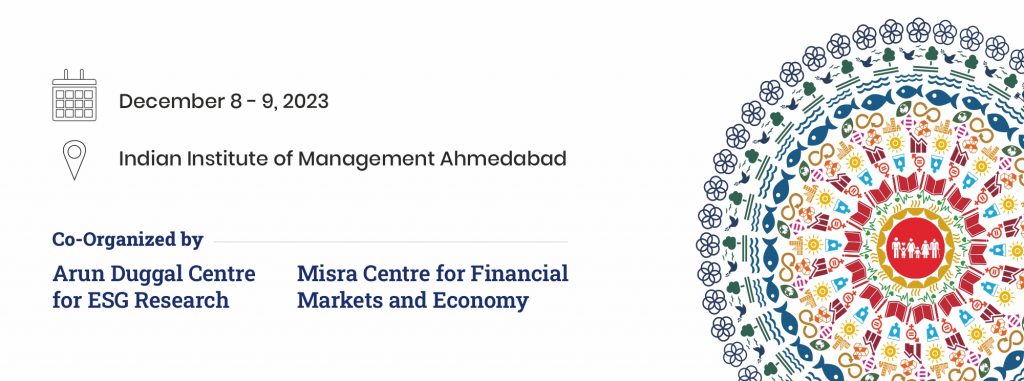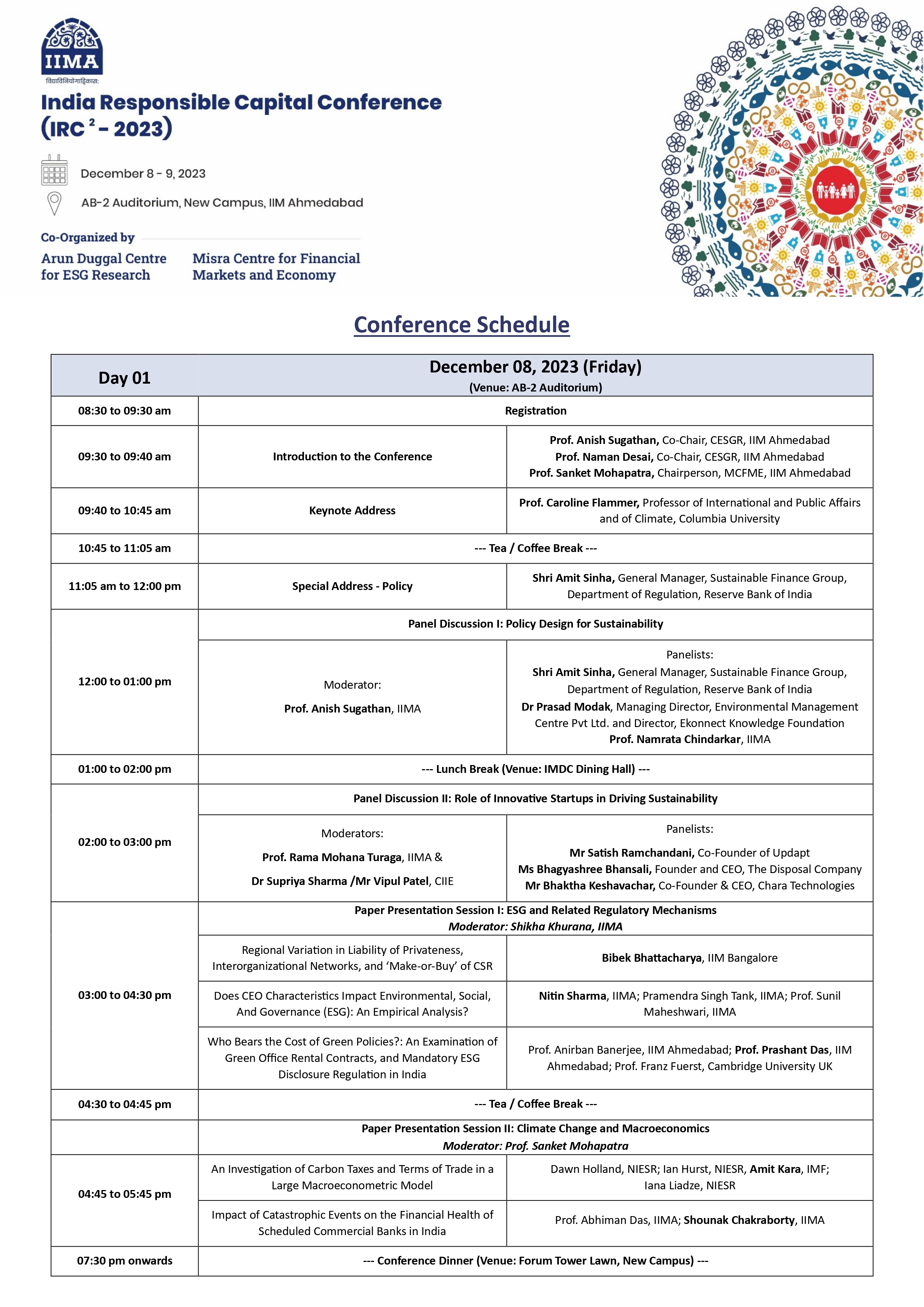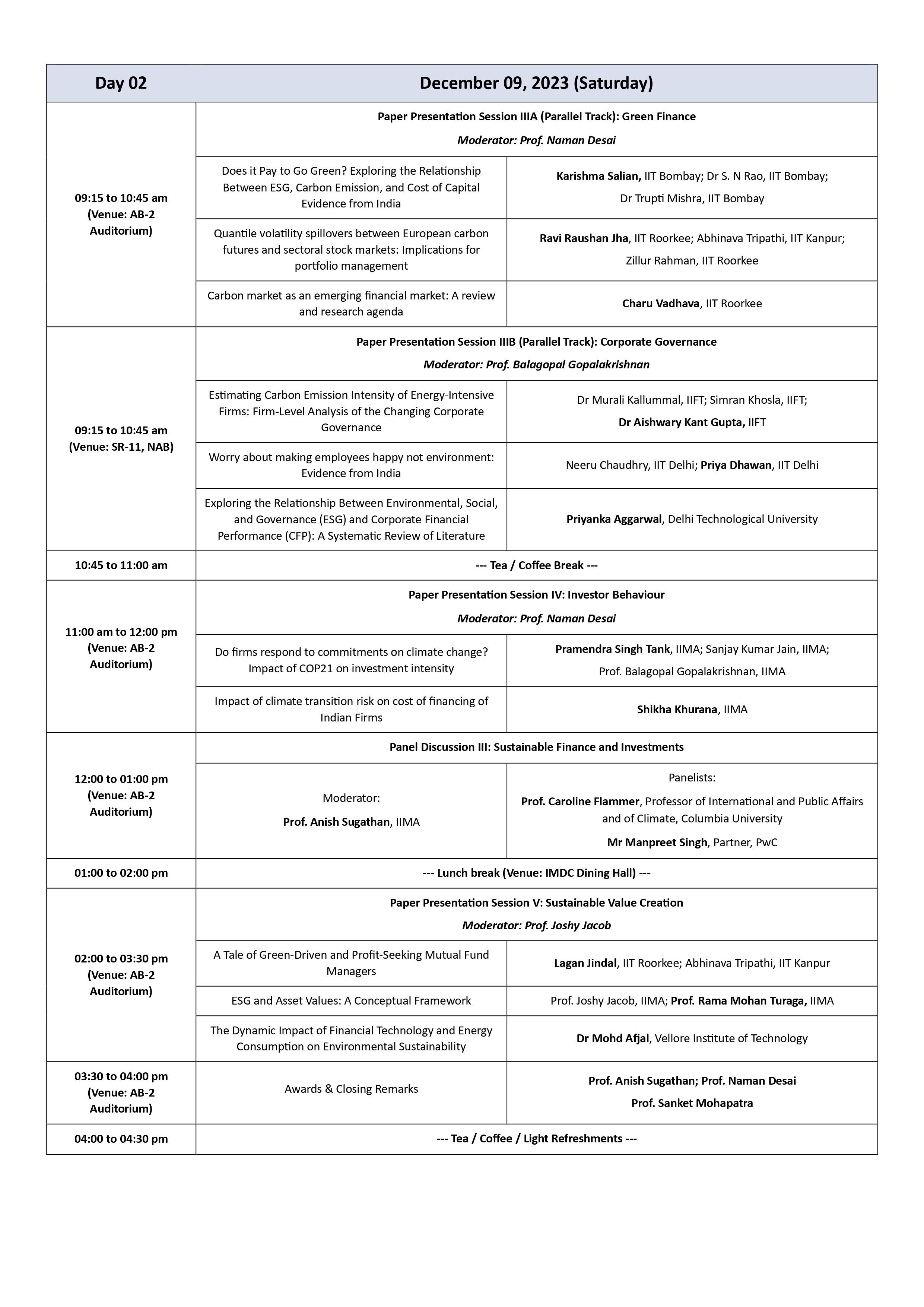
SPEAKERS
1. Prof. Caroline Flammer, Professor of International and Public Affairs and of Climate, Columbia University

Caroline Flammer is a Professor of International and Public Affairs and of Climate at Columbia University with joint appointments at the School of International and Public Affairs (SIPA) and the Climate School, and a secondary appointment at Columbia Business School. She is also a Research Associate at the National Bureau of Economic Research (NBER) and a Research Member at the European Corporate Governance Institute (ECGI). Caroline is an expert in sustainable investing and the recipient of numerous prestigious awards.
Read More2. Mr. Amit Sinha, General Manager, Sustainable Finance Group of Department of Regulation, Reserve Bank of India

Mr Amit Sinha is General Manager attached to Sustainable Finance Group of Department of Regulation in Reserve Bank of India, Mumbai. He has a wide experience of working in different verticals of RBI in various capacities in regulations and operations both. In his over 19-year of career in central banking, he has had the opportunity to work in Reserve Management, Foreign Exchange Management, Currency Management, Consumer Education & Protection, Financial Inclusion, Banking, Premises, etc. He was closely involved in some innovative activities of RBI (like Regulations Review Authority, climate stress test exercise)
Read More3. Dr. Prasad Modak, Managing Director, Environmental Management Centre Pvt Ltd. and Director, Ekonnect Knowledge Foundation

Prasad Modak holds B Tech (Civil Engg), M Tech (Environmental Science and Engg) from Indian Institute of Technology (IIT) Bombay and Doctor of Engg (Environmental Engg) from Asian Institute of Technology, Bangkok. Dr. Modak was a Professor at Centre for Environmental Science & Engineering at IIT Bombay (1984-1994) and later as Professor (Adjunct) at the Center for Technology Alternatives in Rural Areas (CTARA) (2009-2017). He is currently the Managing Director of Environmental Management Centre Pvt Ltd. and Director of Ekonnect Knowledge Foundation.
Read More4. Bhagyashree Bhansali, Founder & CEO, The Disposal Company

Bhagyashree Bhansali, Founder and CEO of The Disposal Company is a social entrepreneur invested in building partnerships that systematically solve for the global waste crisis. As someone who is passionate about sustainability and fair representation, she helps brands & corporates become ESG compliant while also incorporating sustainability into their brand marketing strategies.
Read More5. Bhaktha Keshavachar, Co-Founder & CEO, Chara Technologies

Bhaktha Keshavachar is an Arizona State University graduate and a long-time Intel veteran. Desperate to put “Made in India” on a product that is designed and manufactured in India, Bhaktha co-founded Ezetap, a VC-funded pioneer in the mPOS payment space, with $5B+ transactions annually. As the CTO, amongst other things, he led the team that designed, certified, and manufactured India’s first and only PCI-compliant card reader. Ezetap then went on to get acquired by Razorpay.
Read More6. Satish Ramchandani, Co-Founder, Updapt – an ESG Tech Co.

Satish Ramchandani is the Co-Founder of Updapt – An ESG Tech Co. Prior to Updapt, he has worked in Leadership capacity in firms such as CRISIL S&P Ratings, Bank of America in Head of Business and CFO roles for 20 years.
Read More
CONFERENCE TOPICS
The conference encompasses a broad spectrum of research and case studies on Corporate Governance, Sustainable Finance, and Corporate Sustainability, with an emphasis on the Indian context. Topics include, but are not limited to, the following:
Integrating ESG into Business Models:
This theme focuses on strategies, approaches, and challenges for integrating sustainable ESG principles into business models, emphasizing the alignment of financial objectives with environmental and social considerations. Illustrative research areas include:
- Informativeness of extant ESG metrics and reporting. The challenges of measuring ESG Impact.
- Incorporating environmental, social, and governance (ESG) factors into business decision-making.
- Sustainable business practices and their implications for business performance.
- Sustainability reporting and its impact on financing solutions.
- Innovation and product development for sustainable finance.
Green Finance, Carbon Markets and Sustainable Financing:
This theme explores the innovation and impact of financing solutions that aid in investment flows to projects with environmental benefits and aligned with sustainable development. Illustrative research areas include:
- Green finance and its role in supporting sustainable development.
- Carbon markets and their role in facilitating emissions reduction.
- Climate risk assessment and management in the financial sector.
- Green bonds and sustainable debt instruments for financing climate-friendly projects.
- Open market mechanisms to drive financing for sustainability transition.
- Financing green projects through multilateral and regional institutions.
Sustainability Considerations in Institutional & Retail Investor Behavior:
This theme explores the recent trends driving climate-neutral investments and portfolio management solutions; the role of institutional and retail investors; as well as regulators and policy makers in facilitating wider adoption of sustainable finance. Illustrative research areas include:
- Impact investing by retail and institutional investors in sustainable finance.
- Incorporating sustainability factors into asset management solutions.
- Role of multinationals and green FDI in enhancing innovation capabilities.
- Impact of national and transnational policies in financing sustainable development.
- Choice architecture and the interplay between incentives and nudges in sustainable investment.
Climate Change and Challenges to Macroeconomic & Financial Stability:
This theme focuses on the intersection of climate policy and risks to the macro financial system. It explores the implications of climate change for monetary and fiscal policy, risk management, and the integration of climate considerations into macroeconomic modelling. Illustrative research areas include:
- Integrating systematic sustainability in banking and financial system operations.
- Climate policy frameworks and their impact on financial markets.
- Macroprudential policy responses to climate change risks.
- Implications of climate change for monetary policy and central banking.
- Incorporating climate factors into macroeconomic modelling and forecasting.
Corporate Governance, Ethics and Firm Performance:
This theme explores the relationship between corporate governance, adherence to ethical practices and financial performance, shedding light on the impact of effective governance on organizational success. Illustrative research areas include:
- The influence of board structure and composition on firm performance outcomes.
- Executive compensation and its implications for firm performance.
- Shareholder activism and its effects on corporate governance and financial performance.
- The role of audit quality and financial reporting in enhancing corporate governance.
- Board diversity and its impact on decision-making and firm performance outcomes.
Regulatory Frameworks and Responsible Corporate Behavior:
This theme examines the regulatory frameworks and policies that promote responsible corporate behavior, emphasizing the importance of accountability, transparency, and ethical decision-making. Illustrative research questions include:
- Corporate social responsibility (CSR) and its impact on regulatory compliance.
- Governance mechanisms for ensuring responsible corporate behavior.
- Ethical decision-making in finance and its implications for regulatory compliance.
- Whistleblowing and corporate governance: Encouraging a culture of accountability.
- Regulatory initiatives promoting sustainable finance and responsible investment.
Stakeholder Engagement and Sustainable Value Creation:
This theme explores the role of stakeholder engagement in sustainable value creation, highlighting the importance of collaboration and inclusivity in achieving long-term business sustainability. Illustrative research areas include:
- Engaging employees in sustainability initiatives: From awareness to action.
- Building sustainable supply chains through stakeholder collaboration.
- Investor engagement and the integration of ESG considerations.
- Social impact measurement and evaluation in stakeholder engagement.
- Community involvement and its impact on sustainable value creation.
CONFERENCE SCHEDULE


Conference Videos
1. IRCC 2023- Inaugural Session & Keynote Address
3. IRCC 2023- Panel Discussion on “Policy Design for Sustainability”
4. IRCC 2023- Panel Discussion on “Role of Innovative Startups in Driving Sustainability”
Conference Report

